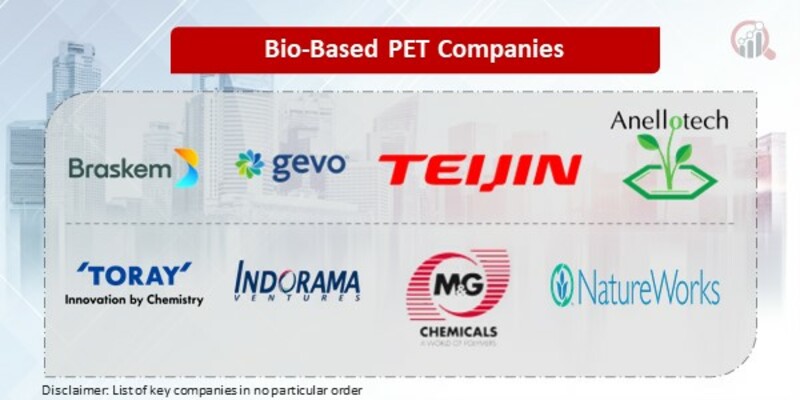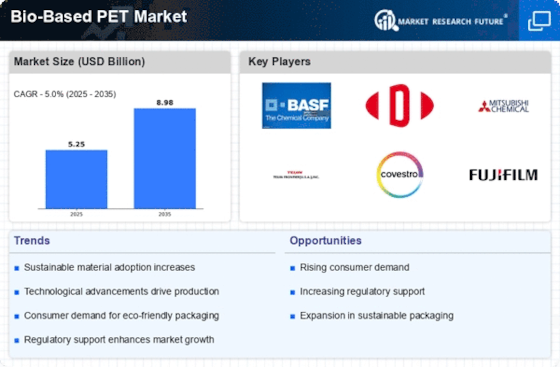Top Industry Leaders in the Bio-Based PET Market
 The Bio-Based PET market is experiencing a surge, fueled by rising sustainability concerns and the growing demand for eco-friendly alternatives to traditional petroleum-based plastics. this market is attracting new players and intensifying competition among established ones. Let's delve into the strategies, key players, and recent developments shaping this dynamic landscape.
The Bio-Based PET market is experiencing a surge, fueled by rising sustainability concerns and the growing demand for eco-friendly alternatives to traditional petroleum-based plastics. this market is attracting new players and intensifying competition among established ones. Let's delve into the strategies, key players, and recent developments shaping this dynamic landscape.
Strategies Shaping the Competition:
-
Investment in R&D: Companies are heavily investing in research and development to improve production efficiency, explore new feedstocks (plant sugars, bio-sourced terephthalic acid), and enhance performance properties of bio-based PET. Examples include Coca-Cola's PlantBottle™ technology and Evonik's REnew PET initiative. -
Vertical Integration: Players are integrating upstream to secure feedstock supply and downstream to manage recycling and waste reduction. NatureWorks, a major bio-based PET producer, owns bio-refineries for feedstock production. -
Partnerships and Collaborations: Strategic partnerships are fostering innovation and market reach. Coca-Cola partnered with Indorama Ventures to produce bio-based PET bottles in Thailand, while Eastman Chemical Company collaborated with Virent to develop bio-based monoethylene glycol. -
Sustainability Marketing: Emphasizing the environmental benefits of bio-based PET, such as reduced carbon footprint and biodegradability, is crucial for attracting customers and brand differentiation. BASF's Terramara™ and PTT Global Chemical's BioPBS™ are actively marketed for their sustainability credentials.
Factors Influencing Market Share:
-
Production Capacity and Cost Competitiveness: Companies with large production capacities and cost-effective processes hold an edge. Mitsubishi Chemical Holdings Corporation and CJ Bio are leading producers with significant scale. -
Regional Regulations and Incentives: Government policies promoting bio-based plastics and carbon neutrality goals create market opportunities. The EU's Single-Use Plastics Directive and California's SB 546 favor bio-based options. -
Brand Reputation and Customer Adoption: Established brands with strong distribution networks and customer loyalty, like Coca-Cola and Unilever, can drive market adoption of bio-based PET products. -
Feedstock Availability and Diversity: Reliance on specific feedstocks can pose risks. Investing in diverse feedstock sources, like corn stover and cellulosic biomass, enhances resilience and sustainability.
Key Players
-
Braskem
-
Gevo, Inc.
-
TEIJIN LIMITED
-
Anellotech, Inc.
-
TORAY INDUSTRIES, INC.
-
Indorama Ventures Public Company Limited
-
M&G Chemicals
-
NatureWorks LLC
-
Novamont S.p.A
-
Plastipak Holdings, Inc.
-
Amyris
-
Toyota Tsusho Corporation among others
Recent Developments :
-
August 2023: Coca-Cola launches its first 100% bio-based PlantBottle™ in Canada, expanding its sustainable packaging footprint. -
September 2023: NatureWorks announces a new joint venture with CJ Bio to build a bio-MEG production facility in South Korea, boosting Asian production capacity. -
October 2023: Evonik partners with SABIC to develop and commercialize bio-based PET for automotive applications, targeting a growing market segment. -
November 2023: The European Commission proposes a new regulation mandating recycled content in PET bottles, potentially impacting the demand for virgin bio-based PET. -
December 2023: PTT Global Chemical Company expands its BioPBS™ production capacity in Thailand, aiming to capture growing demand in Asia-Pacific.











